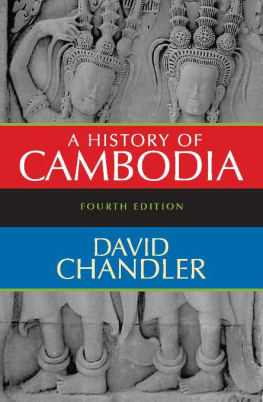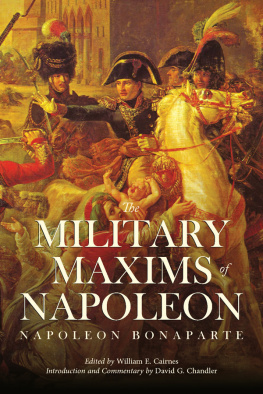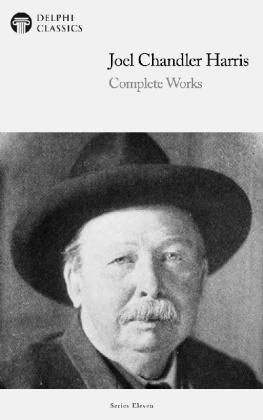

To
Those Officers of the British Army
into whose hands the original may not have fallen, or who may have wanted an opportunity of combining the study of science with its practical application, this little volume is inscribed as a fresh incitement to professional enterprise and acquirement by their faithful and obedient servant
T HE T RANSLATOR
CONTENTS

I. | Frontiers |
II. | Plan of Campaign |
III. | Flanks |
IV. | Junction of Forces |
V. | Forces to be Proportioned to Difficulties |
VI. | Dangers of Retreat |
VII. | Favourable Positions |
VIII. | Unfavourable Positions |
IX. | Strength of an Army |
X. | Inferior Army |
XI. | Lines of Communication |
XII. | Line of Operations |
XIII. | Distance between Corps |
XIV. | Mountain Warfare |
XV. | Enterprise and Bravery |
XVI. | Frontal Attack |
XVII. | Entrenching |
XVIII. | Profiting by Enemy's Indecision |
XIX. | Transition from Defensive to Offensive |
XX. | Changing the Line of Operation |
XXI. | Marching with Convoys |
XXII. | Encamping in Position |
XXIII. | Position Surrounded |
XXIV. | Cantonments |
XXV. | Flanking Attack |
XXVI. | Corps without Communication |
XXVII. | Junction of Retreating Columns |
XXVIII. | Detaching Part of Force at Night |
XXIX. | Fight with the Maximum Force |
XXX. | Flank March |
XXXI. | Leave Nothing to Chance |
XXXII. | Composition of Advanced Guard |
XXXIII. | Entering a Defile |
XXXIV. | Interval between Corps |
XXXV. | Encampments Mutually Defensive |
XXXVI. | Forcing a River |
XXXVII. | Forcing a River |
XXXVIII. | Defending Passage of a River |
XXXIX. | Ttes de Pont |
XL. | Fortresses |
XLI. | Ensuring Success of a Siege |
XLII. | Lines of Circumvallation |
XLIII. | Field Fortification |
XLIV. | Protection against a Surprise |
XLV. | Defence of a Fortress |
XLVI. | Honourable Capitulation |
XLVII. | Mutual Support of all Arms |
XLVIII. | Infantry Formation |
XLIX. | Protection of Cavalry |
L. | Cavalry Charges |
LI. | Cavalry Pursuit |
LII. | Horse Artillery |
LIII. | Complement of Ammunition |
LIV. | Position of Artillery |
LV. | Supplies on the March |
LVI. | Patriotism an effective Aid to Training |
LVII. | Organisation |
LVIII. | First Qualification of a Soldier |
LIX. | Contents of a Knapsack |
LX. | Attaching the Soldier to his Colours |
LXI. | Speeches on the Battlefield |
LXII. | Bivouacking |
LXIII. | Information from Prisoners |
LXIV. | Undivided Command |
LXV. | Councils of War |
LXVI. | General's Judgment |
LXVII. | Death or Victory |
LXVIII. | Dishonourable Capitulation |
LXIX. | Honourable Capitulation |
LXX. | Conduct of General in Conquered Country |
LXXI. | Traitors |
LXXII. | Obedience versus Private Judgment |
LXXIII. | Sound Judgment |
LXXIV. | Chief of the Staff |
LXXV. | Commander of Artillery |
LXXVI. | Duties of Officer in Command of Advanced Posts |
LXXVII. | Leading Principles of Famous Generals |
LXXVIII. | Study of Famous Campaigns |


by David G. Chandler
N o major edition of Napoleons Military Maxims has been published in Great Britain since the turn of this century, notwithstanding there having been many, many dramatic military events upon which comment in the context of Napoleons military genius might well be made. Consequently it would seem an apposite moment to produce an up-dated version of the 1901 edition, retaining the observations of William E. Cairnes relating to the Great Boer War and the original annotations dating back to 1831 or possibly earlier, but adding, in the main, comments on the basis of selected dramatic military happenings of this century the two World Wars, Korea, the post-1945 struggles associated with decolonisation, Vietnam, the Falklands, Grenada, and the Middle Easts whole range of conflicts from 1948 to the present, not to exclude the Gulf War and current events in Afghanistan both of which wars have now long passed their seventh anniversaries. Napoleon would today have been more of a hawk than a dove of peace, and his views on the on-going nuclear debate would have been direct and not to the liking of the faint-hearted. It is a principle of war, he once wrote, that when it is possible to employ thunderbolts their use should be preferred to that of cannon.
What, then, is a maxim? The Concise Oxford Dictionary defines the term as coming from the Latin adjective
Next page


















